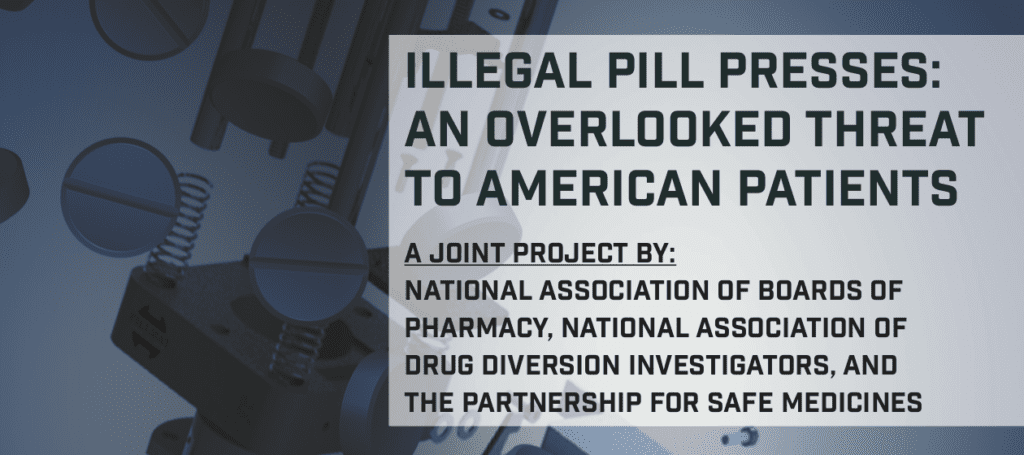New Report: Broad Availability of Illegal Pill Presses Creates Unprecedented Threat to America’s Communities, Patients, and Law Enforcement
Analysis by the National Association of Boards of Pharmacy, National Association of Drug Diversion Investigators, and The Partnership for Safe Medicines Identifies Extent of Pill Press Issue, Opportunities to Address It
Tallahassee, Florida (March 19, 2019) -- The supply and demand of dangerous counterfeit and illegally-imported medications is posing one of our country’s most serious health challenges, and illegal pill presses are directly contributing to this crisis, a new report jointly released today by The National Association of Boards of Pharmacy, National Association of Drug Diversion Investigators, and The Partnership for Safe Medicines has found.
The report, “Pill Presses: An Overlooked Threat to American Patients,” examines the devastating impact of counterfeit medicines, the significant role of illegal pill presses, and challenges facing law enforcement and other government agencies. The research also includes a review of proactive actions under consideration to deter use, decrease risks, provide effective tools for law enforcement and improve patient information and resources.
”Today, the unfortunate reality is that purchasing a pill press is just as easy as one computer mouse click or a 3-D printer away,” said Shabbir Safdar, executive director of the Partnership for Safe Medicines. “In short, pill presses are just about everywhere, and there’s little that’s being done to keep them out of the hands of those who seek to manufacture counterfeit medicines for profit.”
Pill presses are often used to create dangerous counterfeit medications made with illegally-imported fentanyl – available in nearly every state across the country. Inexperienced “garage manufacturers” can purchase a pill press and a counterfeit pill mold that can quickly produce cheap and woefully dangerous counterfeit medicines, risking lives, often resulting in serious harm or death.
Key findings from the new report include:
- Pill presses are broadly available for sale on the Internet and remain virtually untracked. These devices are successfully smuggled through customs as the enormous volume of packages makes compliance challenging.
- The broad availability and sale of pill presses allow novice criminals to make millions of doses of nearly perfect-looking counterfeit pills that can have deadly consequences. For less than $500, an individual with ill intent can purchase a pill press and a counterfeit pill mold that allows them to turn cheap, readily available, unregulated ingredients into a six-figure profit.
- The lack of a deterrent effect poses a serious problem as possession of a pill press carries no jail time.
- Disrupting the availability of pill presses will be challenging. Increasing penalties for the possession of non-registration of a pill press alone is not likely to provide a sufficient deterrent and will require changes in prosecutors’ behaviors and establishing new legal precedents.
“The opioid epidemic is worsened with the easy availability of pill presses and counterfeit die molds. Law enforcement officials must be educated about these devices and given the tools to stop their use,” said Carmen A. Catizone, MS, RPh, DPh, executive director/secretary, National Association of Boards of Pharmacy.
Pill presses can quickly manufacture “bootleg” products – more than thousands per hour – wreaking havoc across an entire city in a single weekend. A single dosage with one extra milligram of fentanyl can be deadly. As policymakers consider proposals to allow the importation of foreign drugs into the United States, a recent analysis by the Partnership for Safe Medicines found that deaths due to counterfeits made with illegally-imported fentanyl have occurred in more than 30 states.
“Every day, law enforcement is struggling to contain illegally-imported fentanyl and other illicit substances,” said Charlie Cichon, executive director of the National Association of Drug Diversion Investigators. “The fact that we have been unable to stem the flood of criminals buying pill presses and illegally making counterfeits should cause us to take a step back and assess how we can work together to address this issue,” he said.
For more information and to download a full copy of the report, visit www.safemedicines.org.
Media Contact:
Farheena Mustafa
(703) 477-4642
farheena@safemedicines.org
# # #
About NABP
The National Association of Boards of Pharmacy is a nonprofit association that protects public health by assisting its member boards of pharmacy and offers programs that promote safe pharmacy practices for the benefit of consumers. Founded in 1904, the NABP aims to ensure the public’s health and safety through its pharmacist license transfer and pharmacist competence assessment programs, as well as through its VIPPS, VAWD, and DMEPOS accreditation programs. NABP’s member boards of pharmacy are grouped into eight districts that include all 50 United States, the District of Columbia, Guam, Puerto Rico, the Virgin Islands, Australia, Bahamas, and all 10 Canadian provinces.
About NADDI
The National Association of Drug Diversion Investigators is the leading drug diversion training organization in the nation, with the largest networking platform for professionals involved in the field of pharmaceutical drug diversion. The NADDI networking platform provides the opportunity to bring diverse viewpoints, education, support, and resources to the individuals facing the challenges in the fight against the misuse and abuse of pharmaceutical drugs.
About PSM
The Partnership for Safe Medicines (PSM) is a public health group comprised of nearly 70 non-profit organizations that are committed to the safety of prescription drugs and protecting consumers against counterfeit, substandard or otherwise unsafe medicines. To learn more, visit www.safemedicines.org.
